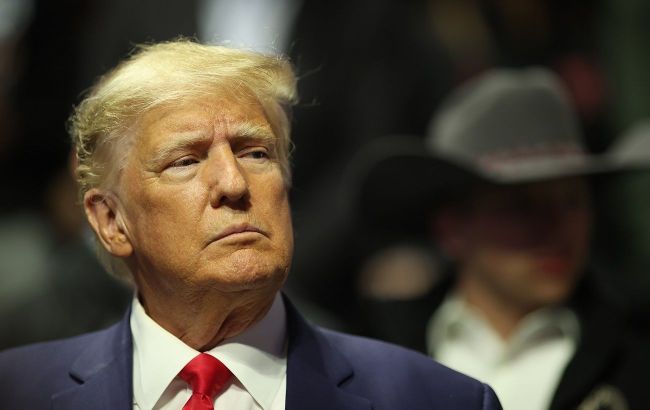Trump’s 'trade wars' strategy: What it means for Ukraine and the world
 Donald Trump (photo: Getty Images)
Donald Trump (photo: Getty Images)
After his inauguration, new US President Donald Trump plans to raise tariffs on imports of foreign goods into the US.
Why this could lead to trade wars with China and Europe and how it will affect Ukraine - read in RBC-Ukraine's article.
Contents:
- Why Trump threatens to raise import tariffs in the US
- What Trump and his team plan
- What China and the EU’s response may be
- How trade wars could impact Ukraine
Why Trump threatens to raise import tariffs in the US
Trump’s key slogan during his election campaign was "Make America Great Again." He claimed that the country’s economy was in decline and that cheap goods from China and other countries made domestic production in the US unprofitable. This contributed to the growing trade deficit between the US and China, as well as other countries.
Trump’s solution, in his view, is to make imported goods more expensive than those made in the US by imposing high import tariffs. This would make it economically advantageous for companies to bring production back to the US in the medium term.
Other countries perceive the imposition of tariffs as hostile actions and are ready to respond. The exchange of such economic blows is what is referred to as “trade wars.”
What Trump and his team plan
Trump pursued this policy during his first presidential term when tariffs of 7.5%- 25% were imposed on Chinese goods, depending on the product category.
When Joe Biden became president in 2021, he retained most of the tariffs imposed by his predecessor on China. However, Trump, upon returning to power, may raise tariffs even further.
“The likelihood is very high because, if you look at global trade as part of globalization, it gives the impression that globalization now works not for the US or the EU, but for China, for countries that are rapidly growing and taking on the functions of global economic leaders. And because this trend does not suit the US and has started to work against it, Trump wants to take steps to raise tariffs,” said Ivan Us, Chief Consultant at the Center for Foreign Policy Studies of the National Institute for Strategic Studies, in an interview with RBC-Ukraine.
The new US Secretary of Commerce will directly implement the tariffs. Trump has already selected Howard Lutnick, a 63-year-old billionaire investor and CEO of the investment company Cantor Fitzgerald, although he has no experience in diplomacy or government service.
Trump may raise import tariffs in early 2025 by an average of 38%. However, different products could range from 15% to 60%. This is the consolidated opinion of more than 50 economists surveyed by Reuters between November 13 and 20.
“Almost 40% is a very high figure, but given Trump’s unconventional approach, I do not rule out that this will happen, at least regarding China, with a high likelihood,” said Us.
At the same time, there is a powerful limiting factor for Trump regarding tariff hikes. During his election campaign, he actively criticized Biden and Harris for the sharp rise in consumer goods prices during their tenure. According to polls, this is one of the key issues worrying Americans.
In the short term, raising tariffs will lead to further increases in the prices of imported goods. According to modeling by the Third Way think tank, imposing a 15% tariff would increase US families' spending on products by 14%. Therefore, Us stated that the potential consequences of each specific tariff would be carefully calculated.
Furthermore, during his first term, Trump used tariffs as a pressure tool in political negotiations, often without implementing them.
On the other hand, countries targeted by tariffs may impose similar measures on US goods.
What China and the EU’s response may be
During Trump’s first presidency, China was caught off guard by the imposition of tariffs. The country’s leadership is better prepared for a potential trade war, although Reuters noted that introducing tariffs would still slow down China’s economic growth.
China has adopted the Foreign Sanctions Law, which allows the imposition of restrictions in response to measures by other countries. China also has a “list of unreliable entities” for foreign companies that allegedly undermine the country’s national interests. This will allow China to negotiate with the US over trade tariffs.
The imposition of new trade tariffs would also have negative consequences for the European Union. According to estimates by the German Economic Institute (Institut der deutschen Wirtschaft), if Trump introduces 20% tariffs on EU countries and the EU responds in kind, the eurozone's GDP could fall by 1.3% in 2027 and 2028. Germany would be particularly affected, with its GDP declining by 1.5%.
Meanwhile, if tariffs of 10% are implemented in 2025, the US GDP will drop by 1.3% and by 1.5% if tariffs of 20% are implemented.
Bloomberg reported that back in October, the EU prepared a list of US goods it may impose tariffs on if Trump introduces tariffs on European imports. However, the imposition of tariffs by the EU is not yet a base scenario and will occur only in response to corresponding actions by the US.
How trade wars could impact Ukraine
Ukraine’s direct impact will be minimal due to the small volume of bilateral trade.
“First and foremost, certain Ukrainian products that are supplied to the US may be affected. However, given the small scale of these exports, our key markets are the European Union, Asia, and Africa, so I don’t think it will be significant,” Us noted.
At the same time, the resurgence of trade wars could lead to significant fluctuations in global prices for goods that Ukraine exports, said the expert. This primarily concerns agricultural products. Depending on how other countries respond to US trade tariffs, the impact could be either positive or negative for Ukraine.
Earlier, RBC-Ukraine reported who Trump plans to appoint to his foreign policy team and what these people say about Ukraine.
Sources: Reuters, Bloomberg, research by the German Economic Institute, the Third Way think tank, and comments from Ivan Us, Chief Consultant at the Center for Foreign Policy Studies of the National Institute for Strategic Studies.

